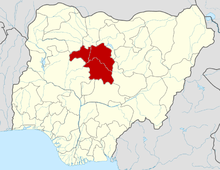Sanga, Nigeria
Sanga (also Igbunbu) is a Local Government Area in southern Kaduna State, Nigeria. Its headquarters is in the town of Gbantu (Hausa: Gwantu). It has an area of 781 km² and had a population of 151,485 at the 2006 census. The postal code of the area is 801.[2]
Sanga Igbunbu | |
|---|---|
LGA | |
| Country | Nigeria |
| State | Kaduna State |
| Government | |
| • Type | Democracy |
| • Executive Chairman | Samuel Shamaki[1] |
| Area | |
| • Total | 302 sq mi (781 km2) |
| Population (2006) | |
| • Total | 151,485 |
| 2006 National Population Census | |
| Time zone | UTC+1 (WAT) |
Boundaries
Sanga Local Government Area shares boundaries with just a single local government area in southern Kaduna State, Jema'a Local Government Area to the west. The rest of its boundaries are shared with Plateau State to the east and Nasarawa State to the south respectively.[3][4]
Population
Sanga Local Government Area according to the March 21, 2006 national population census was put at 151,485. Its population was projected by the National Population Commission of Nigeria and National Bureau of Statistics to be 204,500 by March 21, 2016.
People
The people of Sanga Local Government Area include the Ninzam, Numana, Ninte, Mada (Mœda), Nungu and others of related origin, spoken language and historic affiliations.
Languages
Sanga, being a Local Government Area in southern part of Kaduna state, shares boundaries with Akwanga, in Nassarawa state and Riyom, in Plateau State.
Ninzam[5] is a major language in the area, spoken both in Sanga and neighbouring LGAs in Nassarawa state. Mada (Mœda), being one of the languages widely spoken in Akwanga, Kokona, Keffi and Karu Local Government Areas of Nassarawa state and Sanga and Jema'a Local Government Areas of Kaduna state of Nigeria. Some of these Mada communities have settled in Sanga for more than two centuries, there are communities in Sanga that are solely Mada-speaking.[6]
2014 attacks
On 27 June, 2014:
In Sanga LGA of Kaduna State, 32 people were killed by gunmen suspected to be Fulani militia ... Amber, a village of about 5,000 people, was ransacked ... In Paa, a village close to Gwantu, the town was attacked ... Ten people were killed. The town is also burnt down ... All Ninzom villages, including Gwantu, the LGA, headquarters of Sanga, were deserted as people ran to police stations, primary and secondary schools in nearby towns and into neighbouring states ... The tense situation in the area was making distribution of relief materials to about 50,000 displaced persons almost impossible."[7]
Notable people
- Solomon Lange, gospel singer
- Obadiah Mailafia, economist, politician
References
- "APC Wins 12, PDP five local govts". Premium Times. May 15, 2018. Retrieved August 7, 2020.
- "Post Offices- with map of LGA". NIPOST. Archived from the original on 2012-11-26. Retrieved 2009-10-20.
- "Latest violence in Southern Kaduna Longest on record - Report". Premium Times Nigeria. February 12, 2017. Retrieved August 1, 2020.
- "Kaduna-State-Political-Map". VON. Retrieved August 7, 2020.
- "Ninzo". Ethnologue. Retrieved 2017-04-30.
- "Herders against Farmers: Nigeria's Expanding Deadly Conflict". Crisis Group. 2017-09-19. Retrieved 2020-05-25.
- Midat Joseph; Obed Minchakpu; Andrew Ojih (2014-06-29). "Nigeria: 52 Killed in Kaduna, Bauchi, Taraba Attacks". Leadership (Abuja) - allAfrica.com. Retrieved 2014-06-30.
